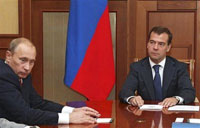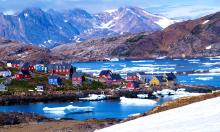Russia’s Medvedev recognizes independence of South Ossetia and Abkhazia
Defying the United States and Europe, Russian President Dmitry Medvedev announced Tuesday he has signed a decree recognizing the independence of the breakaway Georgian territories of South Ossetia and Abkhazia.

Few other nations are likely to follow Russia's lead but the move is sure to further escalate tensions between Moscow and the West.
"This is not an easy choice but this is the only chance to save people's lives," Medvedev said in a televised address a day after Russia's Kremlin-controlled parliament voted unanimously to support the diplomatic recognition.
Medvedev's declaration comes as Russian forces remain in Georgia after a war, staking out positions beyond the de-facto borders of the separatist regions. Abkhazia and South Ossetia have effectively ruled themselves following wars with Georgia in the 1990s.
Russia's military presence seems likely to further weaken Georgia, a Western ally in the Caucasus region, a major transit corridor for energy supplies to Europe and a strategic crossroads close to the Middle East, Iran, Afghanistan, Russia and energy-rich Central Asia.
Russian tanks and troops drove deep into the U.S. ally's territory in a five-day war this month that Moscow saw as a justified response to a military threat in its backyard and the West viewed as a repeat of Soviet-style intervention in its vassal states.
Medvedev said Georgian President Mikhail Saakashvili had forced Russia's hand by launching an Aug. 7 attack to seize control of South Ossetia by force.
"Saakashvili chose genocide to fulfill his political plans," Medvedev said. "Georgia chose the least human way to achieve its goal - to absorb South Ossetia by eliminating a whole nation."
On the heels of Russia's first post-Soviet invasion of a foreign country, recognition was another stark demonstration of the Kremlin's determination to hold sway in lands where its clout is jeopardized by NATO's expansion and growing Western influence.
After Russia's parliament urged the move Monday, the U.S. State Department said recognition of the two areas would be "unacceptable" and U.S. President George W. Bush urged the Kremlin against it.
Subscribe to Pravda.Ru Telegram channel, Facebook, RSS!




